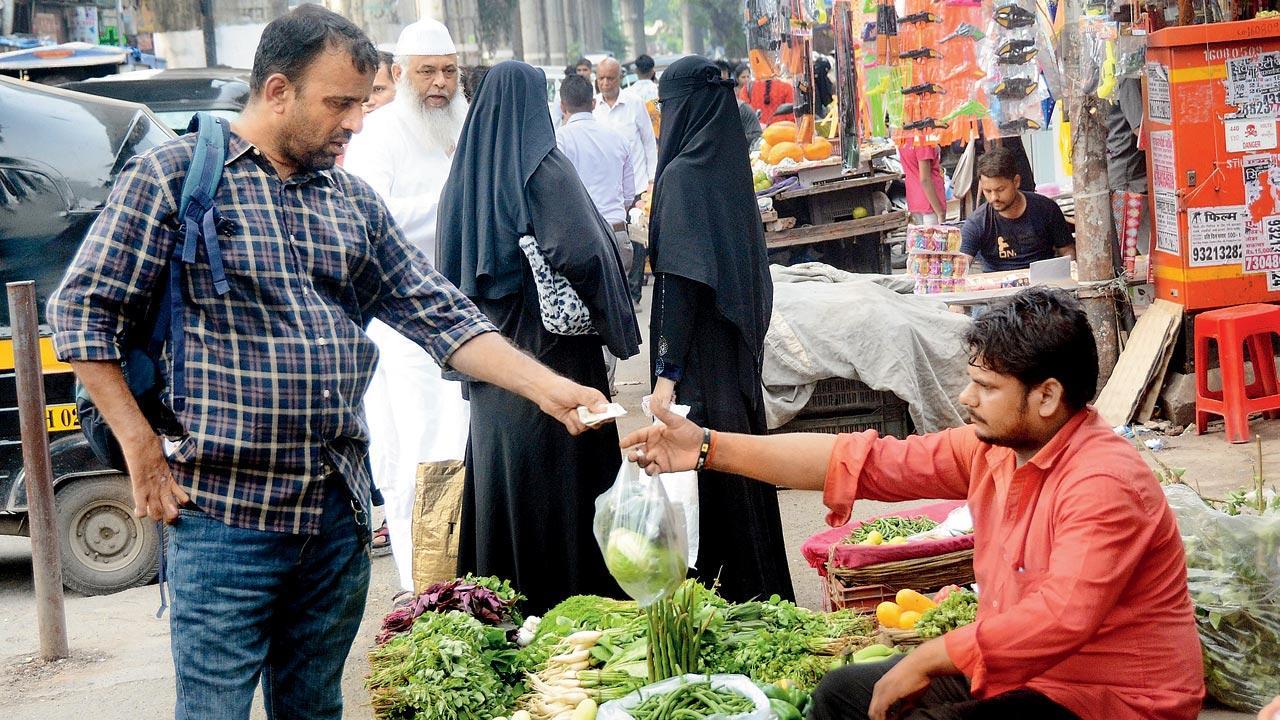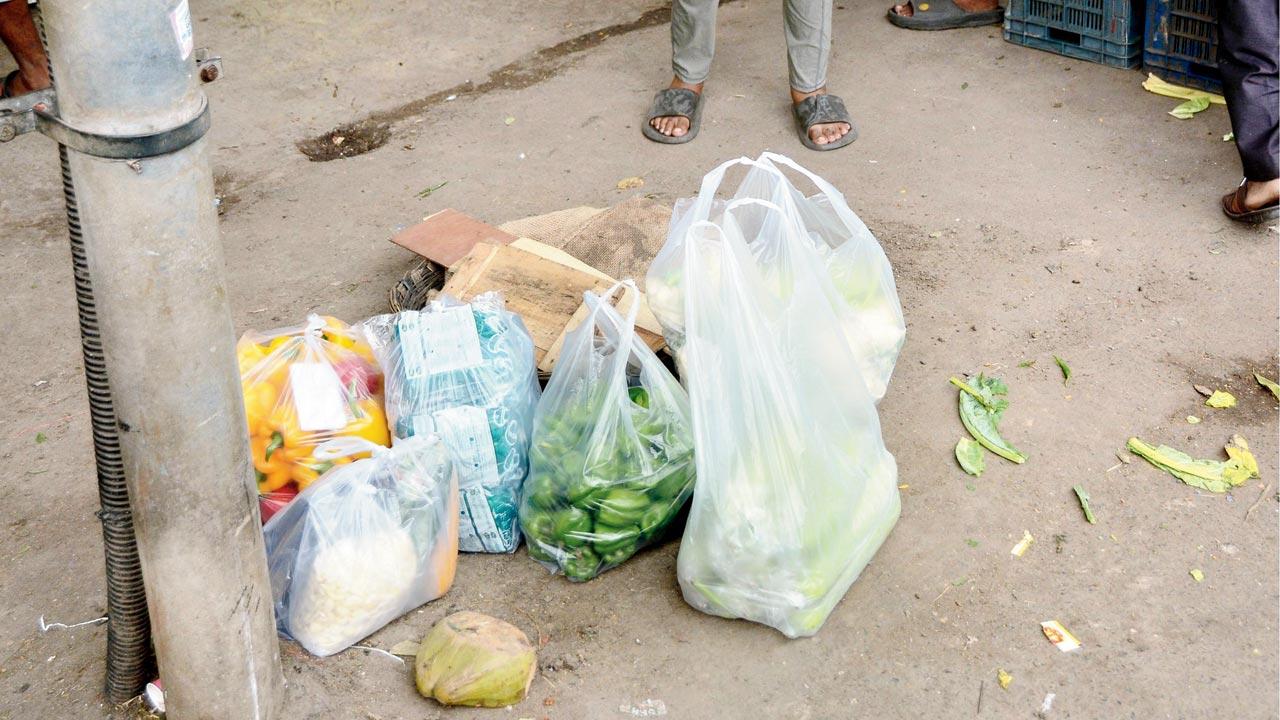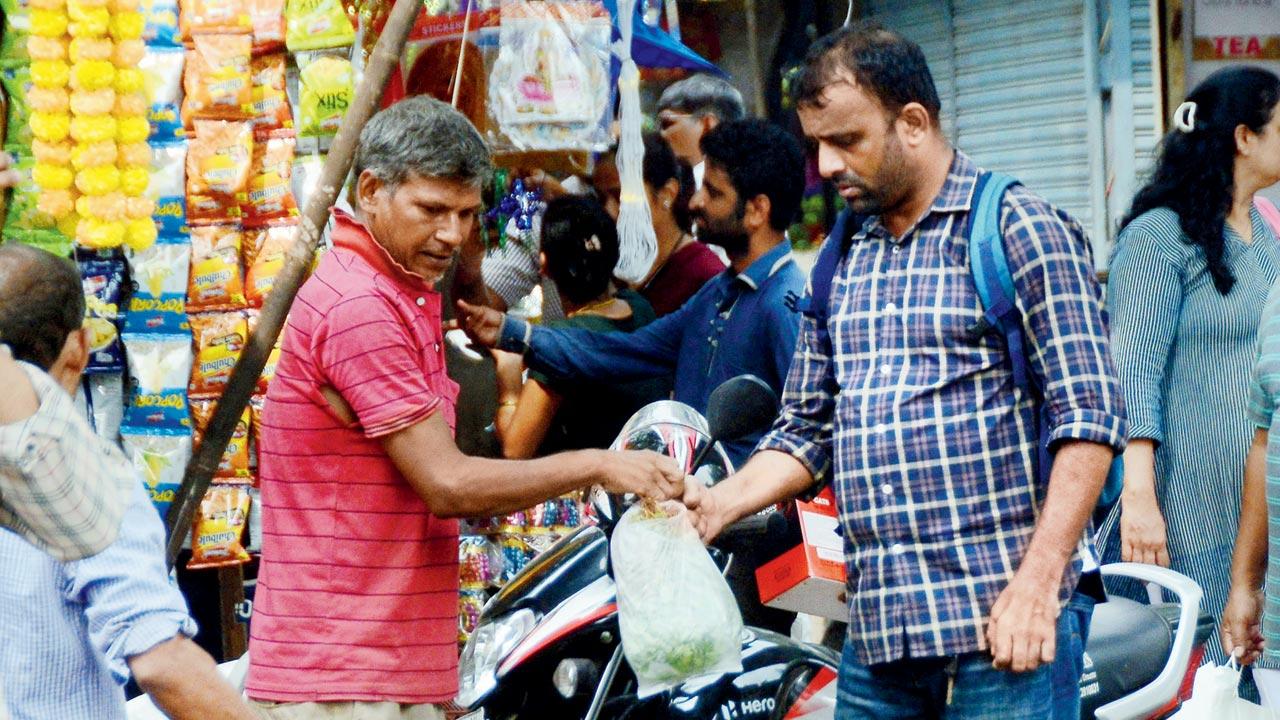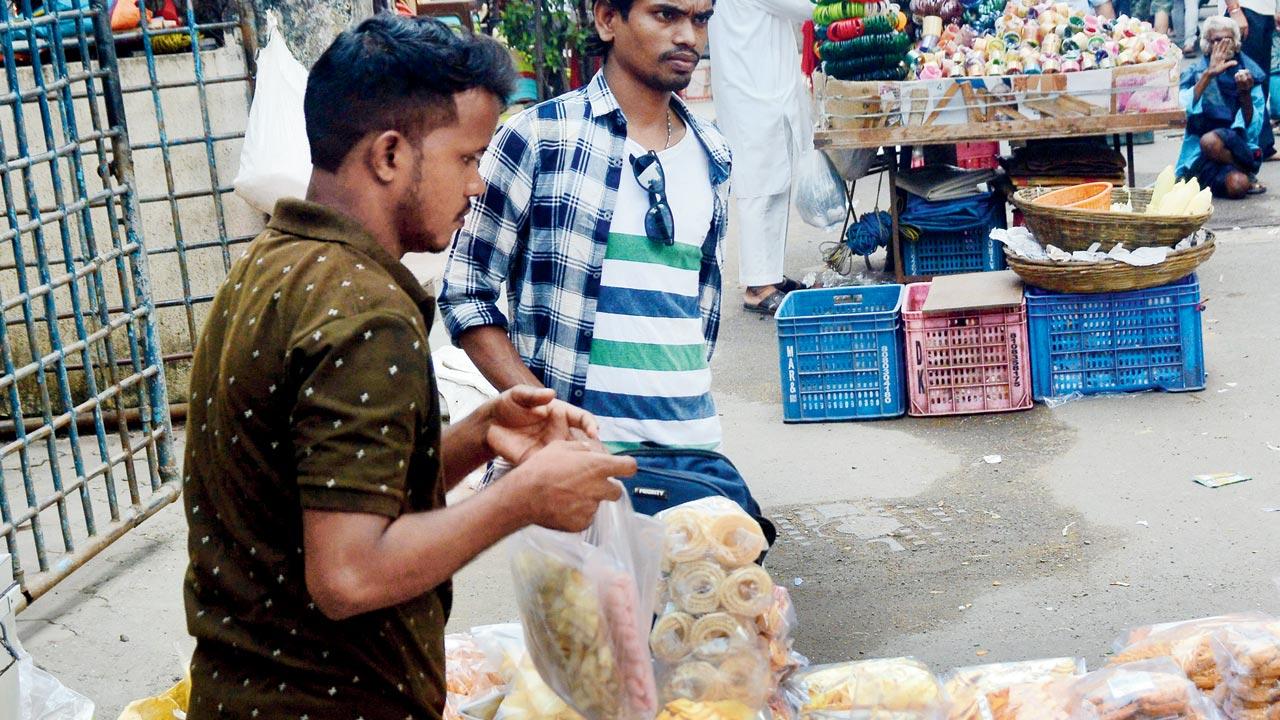In a three-part series, mid-day gives you the low-down on banned items still found aplenty in the city. Part 1: plastic bags

A vendor hands over vegetables to the mid-day reporter in a single-use plastic bag, in Andheri West. Pics/Sayyed Sameer Abedi
Forgot to bring a bag while shopping for vegetables? No sweat, plastic bags are still available in shops and markets all across the city. This despite a nationwide ban on usage as well as production of single-use plastic since July 2022. In a test drive at a few vegetable markets in the city, mid-day found that the situation on the ground is far from reality. Vendors and shopkeepers freely hand over single-use plastic bags to shoppers. This shows how they have no fear of being caught and penalised by the civic body.
Use of banned items including plastic bags and other single-use plastic items, that cannot be recycled and are an environmental hazard, is still a normal, day-to-day thing in shops and markets across the city.
Plastic, plastic everywhere
The vendors at a vegetable market on JP Road, Andheri West were no different. The mid-day team purchased some vegetables, which were handed over in plastic bags. When asked about the ban, the vendor said he was using it only during the monsoon as it becomes difficult for customers to carry the produce in paper bags due to rain.
Also read: World Cleanup Day: How to ditch plastic and other sustainable travel tips
 Plastic bags, which are banned yet filled with vegetables
Plastic bags, which are banned yet filled with vegetables
Another vendor said, “We know that the ban is in effect. We are just finishing the old plastic bags we already have in stock. Customers generally get their own cloth bag whenever they buy vegetables. Now that the monsoon is over, we will get paper bags.”
The situation was the same at the fruits and vegetables market in Goregaon West. Here, the mid-day team found that apart from the use of plastic bags, some vegetables and fruits were covered with plastic too.
A vegetable seller from Anand Nagar in Dahisar said, “Plastic bag ke bina bohot mushkil hoti hai (it gets very difficult without plastic bags).” He said many customers bring their own bags, but there are some who don’t. “We give plastic bags to people who ask for them.”
 A shopkeeper uses plastic bags for vegetables, in Goregaon
A shopkeeper uses plastic bags for vegetables, in Goregaon
When asked if civic officials ever come for inspections, he said, “Before COVID, it was very strict with inspections almost every week. But nowadays, no one comes to check. And the demand for plastic bags increased especially during monsoon.”
When asked about his stock of plastic bags, he said, “Jab raid karenge, tab dekha jayega (we will see when they raid).”
Shops also had other banned items, such as plastic spoons and forks as well as single-use tumblers.
 Apart from vegetable vendors, plastic bags are widely used by shopkeepers too, as seen in this photo from Andheri. Pics/Sayyed Sameer Abedi
Apart from vegetable vendors, plastic bags are widely used by shopkeepers too, as seen in this photo from Andheri. Pics/Sayyed Sameer Abedi
The only thing that was effectively missing from the market is thermocol. When inquired with some shops that sell decoration items, shopkeepers said thermocol cannot be found anywhere in the market, even if customers are willing to shell out more money.
The ban and implementation
The state government banned the use of disposable or single-use plastic and thermocol in March 2018. The government, however, gave users, retailers and manufacturers three months’ time to get rid of such items by June 24, 2018.
The state environment department and Maharashtra Pollution Control Board (MPCB) also published an illustrated guidebook in July 2018. This guidebook was intended to help common people understand what all categories or types of products have been banned in the state.
The Brihanmumbai Municipal Corporation then formed a 249-member vigilance squad in the city. For this, the civic body roped in staff from other departments, especially licence inspectors and staffers from encroachment removal department. This team went on inspections and fined those found violating the ban.
Besides this, the BMC had also started a plastic collection drive by placing boxes at 25 public places in 24 administrative wards and municipal markets across the city. However, the drive came to a halt by the end of 2019.
Then, COVID-19 hit in March 2020, leading to closure or restricted operation of shops. However, even after establishments were reopened as earlier as part of the unlock plan, the raids did not start. With this, the plastic ban move lost its momentum.
As per reports, in the past three and half years since the ban came into effect in Maharashtra, a fine of around Rs 11 crore was collected by the state government from retailers and manufacturers for trading banned items.
Starting July 1, 2022, the Central government imposed a nationwide plastic ban. As per the notification, only plastic bags with a thickness above 75 microns are allowed to be used.
Ban not only solution
Talking to mid-day, environmental activist and founder of Mumbai Sustainability Centre Rishi Aggarwal said there is an urgent need for proper waste management first.
“Plastic is like a genie. It suddenly appeared in our lives and now there is no going back. It can be controlled, but not completely stopped. Emphasis should be given to reducing or restriction of manufacturing of disposable single-use plastic. There should be a combination of pricing and sincere implementation of existing policies like extended producer responsibility, levying carbon tax, etc.”
“If the rate of plastics is increased, consumption will reduce automatically. If people are charged for getting these bags, they will start bringing their own bags to shops. Another step that is urgently needed is an increase in plastic waste prices. If citizens get a good amount by selling plastic waste, they will segregate it from the garbage, preventing plastic from reaching dumping grounds. I would suggest instead of just imposing a ban, at-source carbon tax should be implemented,” he said, adding, “Besides these, proper implementation of solid waste management is needed. Also, why is the government not speaking to stakeholders who have solutions?”
OfficialSpeak
Deputy Municipal Commissioner (Special) Sanjog Kabare told mid-day, “The action on plastic ban violators never stopped until the pandemic. It stopped during the two years of pandemic. Seizure of the banned items again started when everything reopened after the lockdown. Following the Union government’s notification, we intensified action against violators.”
As per BMC’s data, it confiscated 3,653 kg of banned plastic items from across wards between July 1 and November 10. The civic body also collected R31 lakh fine from violators, mainly shopkeepers, during the same period.
“It is not that we are not taking action against hawkers. Raids and checks are conducted regularly. As compared to pre-COVID times, we have observed that the number of violations has gone down. However, people are still not giving up on plastic items,” Kabare added.
BMC data reveals that it had collected 1.42 lakh kg of banned plastic from across the city in June 2018, the month when the state ban came into effect. As per the civic body’s statement issued a year later on June 26, 2019, the vigilance squads collected R3.47 crore as fine besides lodging 489 cases against offenders in a year.
Penalties and punishment
As per section 9 of the Maharashtra Non-biodegradable Garbage (Control) Act, 2006, offenders will be fined up to Rs 5,000 for the first time, and second-time offenders will have to pay a penalty of Rs 10,000. For each subsequent offence, the accused is liable to get up to three months in jail and a fine of Rs 25,000.
Rs 31lakh
Fine collected by BMC from July 1 to November 10 this year
June
Month in 2018 when the state govt banned single-use plastic
Action taken in city
From June 2018 to March 2020
Shops and establishments raided: 16 lakh
Banned plastic seized: 86,000 kg
Fine collected: Rs 4.65 crore
From July 2022 to November 2022
Banned plastic seized: 3,653 kg
Fine collected: Rs 31 lakh
 Subscribe today by clicking the link and stay updated with the latest news!" Click here!
Subscribe today by clicking the link and stay updated with the latest news!" Click here!










